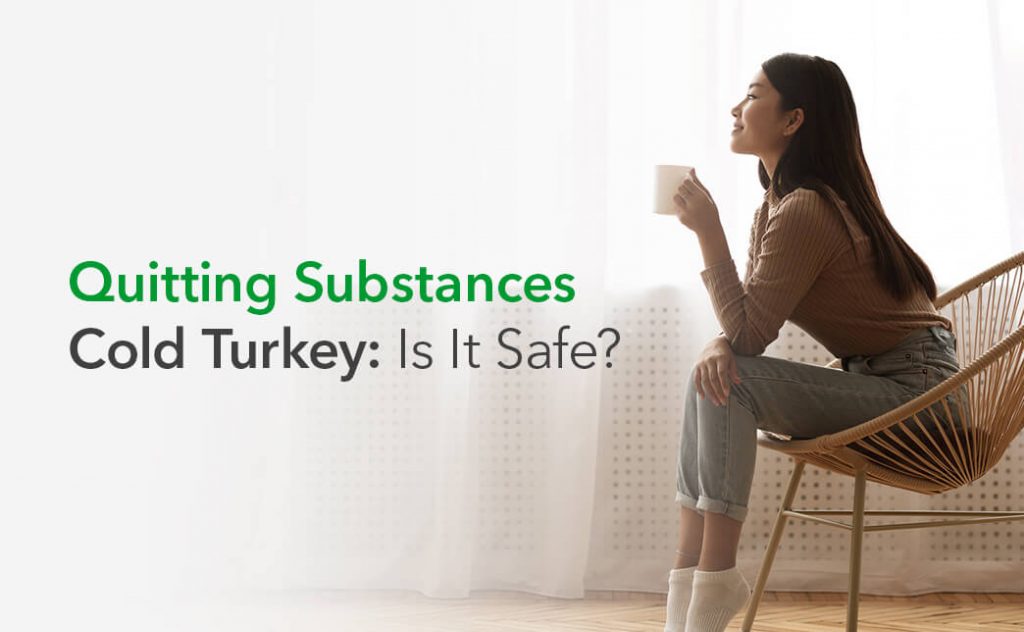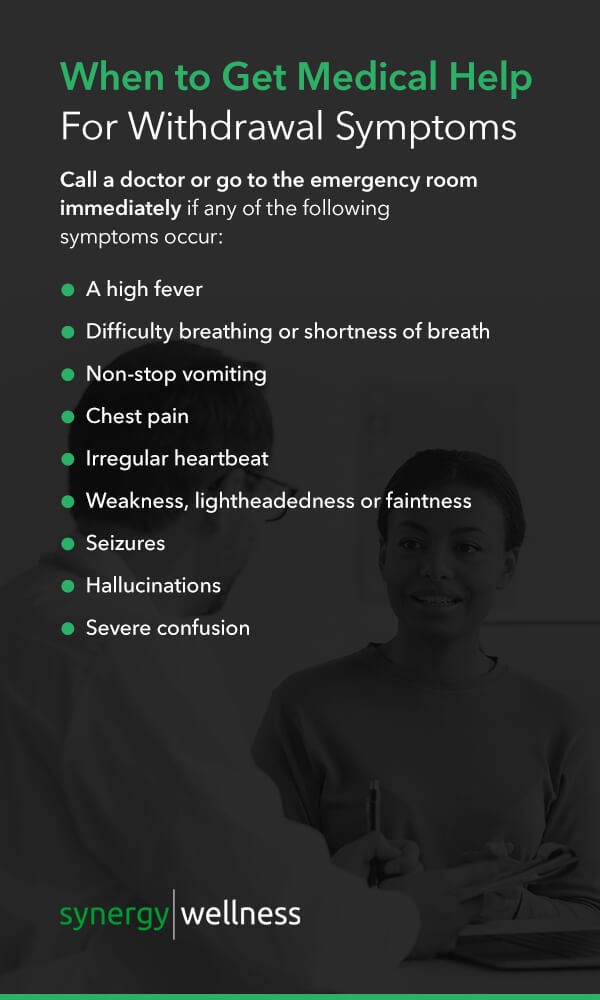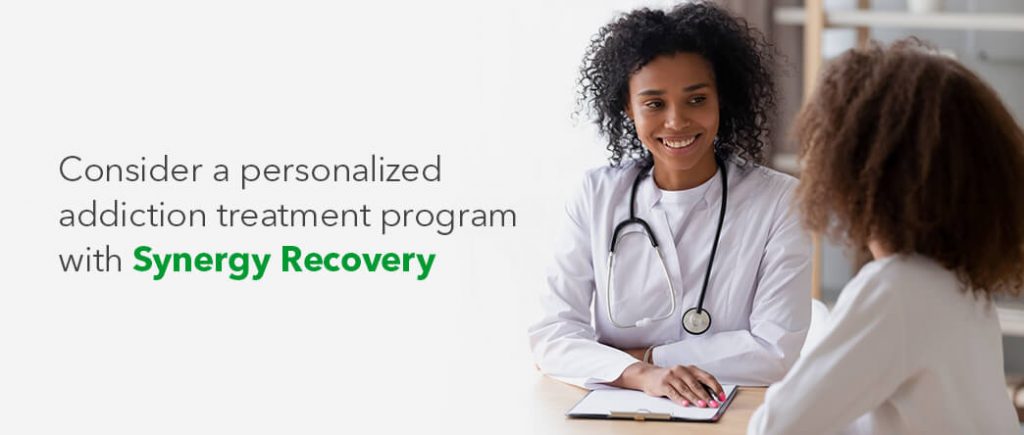
Deciding to quit using a substance and reaching a point of resolve is a massive step toward addiction recovery. Recognizing the problem and being willing to make a change is crucial to beating substance use disorder. However, stopping drugs cold turkey instead of enrolling in a recovery program comes with significant risks and dangers.
Before quitting a substance cold turkey, make sure you weigh the health risks. This article will go over what quitting cold turkey means, cold turkey withdrawal symptoms, whether cold turkey is safe and addiction recovery program options. Keep reading to find out the safest choices for overcoming addiction.
Why Do People Go Cold Turkey?
Typically, people attempt to quit substances cold turkey when they want to abruptly stop using without receiving any outside help. Most people try cold turkey methods at home with no means of intervention or medical assistance. It’s considered a quick-fix method that allows people to stop taking a substance immediately instead of gradually tapering off of it.
Quitting cold turkey is often appealing to people on the surface level because it offers the opportunity to remain in the privacy of their own homes. Staying at home and handling things independently allows people to avoid the social stigma and scrutiny that sometimes comes with reaching out for help overcoming addiction.
Some people also go cold turkey because they think they won’t be as tempted to use tobacco products, alcohol or another drug if they just get rid of it altogether. However, trying to quit too quickly and alone may not be an effective way to quit, particularly for those dependent on a substance. Stopping too fast can result in severe withdrawal symptoms and a strong urge to start using a substance again.

Why Is It So Hard to Quit Drugs or Alcohol Cold Turkey?
Both quitting drugs cold turkey and quitting alcohol cold turkey is extremely difficult for two primary reasons — increased cravings and withdrawal symptoms. When you become addicted to a substance, your body develops an unhealthy physical and mental dependence on the substance. As a result, the body and brain begin to rely on those chemicals to maintain their equilibrium.
Quitting cold turkey abruptly purges the body and brain of the substance, throwing off their balance as they try to go back to their non-addicted state. This process leads to intense cravings and serious withdrawal symptoms that can influence your physical, mental and emotional health.
How difficult it is for someone to quit cold turkey depends on the following three key factors:
- The substance they’re addicted to: Whatever substance the body is conditioned to depend on has a considerable impact on the severity and type of withdrawal symptoms someone who quits cold turkey experiences. Highly addictive drugs, such as opioids, heroin and benzodiazepine, can cause more severe withdrawal side effects.
- The severity of the addiction: The length of time anyone uses a substance and the dosage they’ve become accustomed to usually determines how dependent their body and brain are on the substance. A more severe addiction tends to come with more intense withdrawal symptoms.
- Additional mental health or medical conditions: Any psychological or medical conditions can make substance withdrawal more complicated. Both of these factors make stopping cold turkey more unpredictable and, in some cases, dangerous.
Regardless of how someone experiences the factors above, the challenges of stopping cold turkey can jeopardize a person’s health, along with their ability to achieve and maintain sobriety. For this reason, it’s best for those battling an addiction to seek help and receive addiction treatment like detoxification, which allows them to gradually purge substances from their system in a safe and controlled environment.
Risks of Quitting Cold Turkey
Quitting a substance cold turkey suddenly removes a substance from the body that it’s come to rely on, resulting in the body failing to function correctly. Without the presence of the substance, the body starts experiencing unpleasant withdrawal symptoms and more intense cravings.
The specific risks of quitting a substance cold turkey can range from mental and emotional issues to physical changes. Different substances will lead to various withdrawal symptoms and can vary significantly among patients. While some withdrawal side effects may be mild, others can be potentially lethal.
In general, anyone stopping substance use may experience these withdrawal symptoms:
- Agitation and irritability
- Mood swings
- Anxiety
- Depression
- Mental fog
- Nausea
- Stomach pain and cramps
- Vomiting
- Pain sensitivity
- Muscle aches and headaches
- Loss of appetite
- Difficulty sleeping and insomnia
- Irregular heartbeat
Cutting off your body and brain from an addictive substance too quickly can lead to even more serious symptoms. In some cases, abruptly quitting a substance may lead to death. Notably, quitting cold turkey may include these dangerous side effects:
- Tremors
- Changes in blood pressure
- Delusions
- Hallucinations
- Tachycardia
- Seizures
- Coma
For the sake of safety, an individual needs to go through the detox and withdrawal process in a controlled environment that offers quick access to medical attention. Being close to doctors and medical staff can help prevent potentially life-threatening withdrawal side effects from happening.
Uncomfortable withdrawal side effects can also drive a patient back to using a substance to make the symptoms go away. However, relapsing can be dangerous because a patient’s tolerance for a substance decreases once they stop using it. If they do start using that substance again, they’ll be more likely to overdose accidentally.
Attempting to quit a substance cold turkey at home without the guidance, assistance and support of medical professionals puts those in recovery at a greater risk of relapse. Going through withdrawal alone in an environment that may not be substance-free makes it more tempting to turn back to using for relief.

When to Get Medical Help For Withdrawal Symptoms
If you or someone you know is trying to quit cold turkey, it’s imperative to be aware of and monitor withdrawal symptoms. If the symptoms become severe, medical attention may be necessary. Call a doctor or go to the emergency room immediately if any of the following symptoms occur:
- A high fever
- Difficulty breathing or shortness of breath
- Non-stop vomiting
- Chest pain
- Irregular heartbeat
- Weakness, lightheadedness or faintness
- Seizures
- Hallucinations
- Severe confusion
These symptoms may be life-threatening and should be treated by a medical professional as soon as possible.
Drugs That Shouldn’t Be Quit Cold Turkey
While quitting any substance cold turkey comes with health risks, certain drugs are especially dangerous to stop using cold turkey. It’s crucial not to quit any mind-altering substance cold turkey because they have the potential to cause severe withdrawal symptoms, a medical emergency or even death.
These substances include:
- Heroin
- Methamphetamine
- Cocaine
- Prescription sedatives and tranquilizers, such as sleep aids and benzodiazepines
- Prescription painkillers, such as oxycodone, fentanyl and hydrocodone
- Alcohol
Mind-altering substances directly interfere with brain chemistry. These substances can disrupt the central nervous system’s signals, affecting a person’s mood, memory, willpower, pain sensations, learning functions and perceptions of self and surroundings. Making any quick changes to the amount of a mind-altering substance the body receives can result in drastic side effects.
Potential withdrawal symptoms when quitting mind-altering substances cold turkey include:
- Clammy skin and sweating
- Headaches and dizziness
- Nausea, vomiting and diarrhea
- Muscle weakness and fatigue
- Irritability, aggression, agitation or hostility
- Anxiety
- Depression
- Cognitive difficulties
- Severe cravings
Medical detoxification is often the safest method for keeping these symptoms in check and under control. Detoxing in a specialized facility can help the body process opioids, alcohol and other substances while avoiding potential life-threatening consequences due to severe withdrawal side effects.
Patients usually taper off of mind-altering drugs slowly during the medical detox process, which gives the brain ample time to stabilize and attain a level of physical balance before proceeding with treatment. Throughout the tapering time, the amount of a drug in the patient’s system gradually lowers instead of withdrawing suddenly so the brain has time to restore itself to its previous working order after each step of the process.
Many substance medical detox and recovery programs also include medications to help manage difficult withdrawal symptoms and cravings. Without the need to reduce intensely unpleasant withdrawal symptoms, the risk of relapse and overdose decreases.
Medications Used to Help Taper of Off Drugs
Many medications are available to help patients overcome substance addiction by minimizing both cravings and withdrawal symptoms. Because the medications are specially formulated to relieve withdrawal symptoms, patients don’t have to worry about becoming addicted to them. When combined with counseling, supportive care and psychotherapy, these medications are safe and effective.
Furthermore, addiction recovery patients may achieve long-term sobriety with the help of medication. For more information about specific medication-assisted treatment methods and how they work, read up on some of the most common prescriptions below.
Nicotinamide Adenine Dinucleotide (NAD) Treatment
NAD is a metabolic coenzyme that can repair brain pathway damage caused by substance addiction. As a crucial part of producing energy, NAD is significantly involved in DNA repair and cell repair. NAD treatment can restore a patient’s neurotransmitter supplies, which allows the brain to get back to its optimal functioning so the patient has the clarity of mind to recover successfully.
Suboxone and Subutex Treatments
Both Suboxone and Subutex are prescriptions that help suppress common withdrawal symptoms and cravings during opioid recovery. Suboxone, which contains buprenorphine and naloxone, and Subutex, which contains buprenorphine, attach to the brain’s opioid receptors. These receptors become stimulated from many substances, including heroin, prescription pills and other opioids. By blocking receptor activity, these medications prevent other substances from causing a “high,” making the substances ineffective and relapse less likely.
Probuphine Opioid Treatment
Probuphine is the first under-the-skin implant treatment for opioid dependence approved by the FDA. A Probuphine implant administers a consistent, low-level dose of buprenorphine, the standard medication for substance use disorder patients. Probuphine implants work as a six-month maintenance treatment for patients already stabilized on buprenorphine. After, a physician removes the implant.
Naltrexone Implants
Naltrexone is a prescription medication that blocks the brain’s opioid receptors to prevent the euphoric feelings and cravings one can get from substances like opioids. Rather than quitting heroin cold turkey, some patients can use Naltrexone implants to reduce drug and alcohol cravings, which helps patients recovering from addiction avoid relapse.
Vivitrol Treatment
This type of treatment is a monthly injectable medication used for relapse prevention for opioid and alcohol addiction patients. The medication contains naltrexone, which blocks opioid receptors and influences the release of dopamine in the brain to inhibit the “high” of using certain substances. Opioid-dependent patients must go through detox and be opioid-free for at least a week before starting Vivitrol treatment.

Outpatient Rehabilitation and Detox as Alternatives to Quitting Cold Turkey
There are safer alternatives to becoming substance-free than by going cold turkey. Monitored programs like outpatient rehabilitation and medical detoxification enable patients to safely taper off of substances while keeping their withdrawal symptoms and cravings in check.
Specifically, signing up for a professional rehabilitation program offers these benefits:
Time to Heal
Participating in a rehabilitation program gives your body and brain the time they need to heal fully. Addiction adversely affects components of cerebral functionality, such as neurotransmitters and synapses, and vital organs like the heart and liver. Drug and alcohol rehab can help diagnose, treat and monitor any addiction-related illnesses.
While addiction also impacts mood and mental health, time in rehabilitation can provide relief from the stresses of everyday life that may have spurred addictive behaviors. Rehabilitation offers time to slow down, reflect and heal from the root causes of substance use disorder. Inpatient, outpatient and partial hospitalization rehabilitation programs all offer enough of a reprieve from life’s stressors to make addiction recovery more attainable.
Well-Managed Withdrawal Symptoms
One of the most challenging parts about trying to quit using a substance on your own is dealing with uncomfortable withdrawal symptoms. Abruptly stopping the use of some substances may even be life-threatening and lead to serious health complications even after days of sobriety.
Participating in a rehabilitation program and medical detox ensures medical professionals can closely monitor a patient’s health and progress. Addressing withdrawal symptoms medically prioritizes safety and gives patients the extra help of addiction medication treatments. These treatment measures prepare a patient both physically and mentally for long-term sobriety.
Skills to Stay Sober
A reliable outpatient rehabilitation program can set patients up to stay sober for the rest of their lives by teaching them essential life skills. Receiving sobriety skills and instructions from trained professionals helps addiction patients achieve life-long sobriety.
Group rehabilitation therapy sessions also provide patients with connections and a trusted community to help lift them up whenever they struggle. Overcoming the loneliness of addiction increases the likelihood of long-term recovery success.
Begin Recovering From Addiction at Synergy Recovery
If you’re looking for a safe and trusted way to overcome substance use, consider a personalized addiction treatment program with Synergy Recovery. At Synergy Recovery, we offer patients a comprehensive addiction treatment program that incorporates both psychosocial counseling and prescription medications to help them recover safely and effectively. This experience happens in a calming, spa-like environment to help you achieve health and happiness.
To learn more about our addiction treatment programs and schedule your first appointment, contact Synergy Recovery today.




